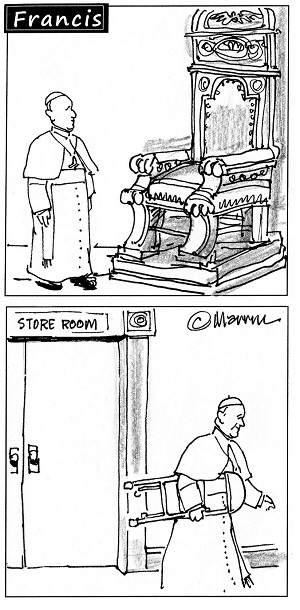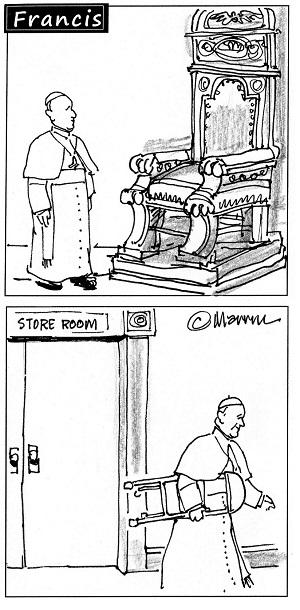

“You are Peter, and upon this rock I will build my Church” (Matt 16:18).
1 Pet 5:1-4; Matt 16:13-19
In the 1965 film, “A Thousand Clowns,” Jason Robards plays Murray Burns, an eccentric comedy writer whose unemployed status threatens his legal custody of his 12-year-old nephew. In one of the key lines from the film about his hopes for his nephew’s independence in a conforming society, he concludes: “I want him to know the subtle, sneaky, important reason why he was born a human being and not a chair.” https://en.wikipedia.org/wiki/A_Thousand_Clowns
If this seems an odd way to back into today’s commemoration of “The Chair of St. Peter the Apostle,” it is also an affirmation that the mystery of the church is much more than a piece of furniture or even a metaphorical stone on which the authority of the pope as head of the apostolic leadership and succession rests. These symbols are part of the institutional claims for the primacy of Peter and Rome often contested historically when Christianity emerged as a world religion.
In today’s Gospel, Jesus makes Simon Peter the cornerstone of the church with a pun: “You are Peter and upon this rock I will build my church.” As a leader, he proved more Simon (“reed”) than Peter (“rock”), but the symbolism endured. There was no actual cornerstone, nor did Peter have a chair other than the seat by the tiller in his fishing boat, another symbol of the church. Jesus himself claimed itinerant freedom from shrines or relics, leaving only an empty tomb and the words, “The son of man has nowhere to lay his head” (Matt 8:20), freeing him to be everywhere and often a stranger in our midst.
If Peter, like Jesus, had any authoritative throne it was a cross, and Peter, tradition holds, was crucified upside down, preaching the upside-down church entrusted to him in which the first are last and leaders are servants. He desperately needed God’s mercy and became the chief evangelist for mercy as someone who failed and had to be rehabilitated to lead a church that welcomes failures. Pope Francis has done his best to affirm God's mercy and the humility of his role by living in the guesthouse, carrying his own briefcase and avoiding the more theatrical aspects of the job.
We celebrate the church’s stability and accept the symbols of authority that have made its mission and teachings a guiding light in the often murky and fluid nature of history. We have learned the importance of these symbols by witnessing the desecration of the nation’s Capital and the fragility of the principles and values enshrined the founding documents on which the American democracy rests. When any institution, whether church or state, lives up to its ideals, it is worth celebrating and preserving.
Jesus would have agreed with Murray Burns that the purpose of social structures and religious beliefs is to produce genuine human beings. They are the living embodiment of God’s image and likeness on earth and signs of the mystery of divinity bestowed on humanity as our ultimate destiny.
Advertisement








